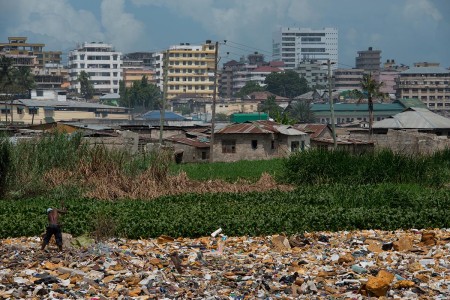
A man sifts through mostly plastic trash which washed into Jangwani by recent flooding. Photo: Daniel Hayduk
Certain types of plastic bags have been banned in Tanzania since 2013, but some Members of Parliament (MP) are still left wondering when the government will be enforcing the law.
Last week, special seats MP Mkiwa Kimwanga asked what the government’s position was on plastic bags and their detrimental environmental effect.
The law has been publicly criticized as being ‘toothless’ and columnists say ‘nobody seems to care‘ as the bags are still widely used.
But the government says they are taking legal actions against companies manufacturing or importing bags under 30-microns.
As of May 30, 2015, vendors of all sizes in mainland Tanzania are required to charge their customers for plastic bags which are stamped with a producer or supplier’s identity.
“The government, through National Environment Management Council (NEMC) continues to conduct inspections in manufacturing industries, companies and shops manufacturing and distributing the plastic bags to ensure they follow the law,” says deputy minister Stephen Masele, who works for the Vice-President’s Office Environment Division.
Bags under 30 microns (also known as micrometres) are illegal in mainland Tanzania and bags under 100 microns have been illegal in Zanzibar since 2005, where paper bags are now commonly used in stores.
Addressing parliament this past week, Masele also warned against a common cooking practice: using plastic bags to store hot foods, as it may lead to cancer and blindness.
In 2012, the East African Community (EAC) passed a bill to regulate plastic bags under 100 microns.
Uganda, Kenya and Rwanda have also laws limiting what types of plastic bags are acceptable.
